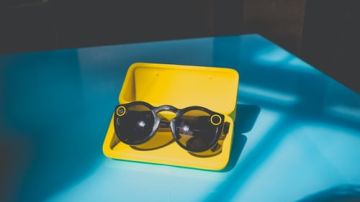Young Women Are Getting Surgery To Look Like Their Snapchat Filters
There is a disturbing trend in the cosmetic surgery world—Snapchat Dysmorphia

Photo: Unsplash/@neonbrand
There is a disturbing trend in the cosmetic surgery world—Snapchat Dysmorphia. The term, coined by Dr. Tijion Esho, a cosmetic doctor, is the phenomenon that people want to look like their digital, heavily edited, Snapchat filter selves. The days of bringing in a picture of a movie star, and using her nose as a reference point of how you want your nose to look are officially over. Today, more and more young people want to look like their selfie filters. The Department of Dermatology, Boston University School of Medicine authored an article where they not only name the condition but also detail how selfie filters and the mishandling of social media is having a negative impact on a young person’s self-esteem and mental health.
The rising trend is concerning many cosmetic surgeons because they are seeing that young people may be blurring the lines between reality and fantasy. It is one thing to reconstruct your nose based on another person’s structure, but to ask to change your nose to look more like a filter creates the idea that the unattainable is attainable. It not only creates unfulfilled desires but a skewed idea of what is natural. Snapchat offers up to 20 filters while Instagram offers up to 40 filters. This means that young people have 60 total filters to choose from if they use both social media apps, giving them the ability to see their own appearance altered, digitally and ultimately, becoming more vulnerable to low self-esteem.
Melissa Wasserman, PsyD, Clinical Psychologist tells HipLatina that “self-esteem is a risk factor for depression and is a vulnerability or risk factor for the development of mental health concerns or problems.” However, it’s important to note that science is still debating the “chicken or the egg” question. Another model of self-esteem is the Scar Hypothesis, which, is the idea that self-esteem is the result or outcome that stems from a mental health disorder. “There’s a mixed bag of reviews which includes studies showing that social media updates and posts could make people aware of their own limitations, resulting in decreased self-esteem. Or social media activity might solely display selective aspects of the self which may be reinforced (through positive feedback) by other and therefore increase self-esteem.”
Whether the chicken or the egg came first, young people’s self-esteem is being affected and potentially trigger body dysmorphic disorder which is a disorder growing amongst millennials. Angelina, 15, tells HipLatina about how social media can affect people her age.
“Social media nowadays makes you doubt yourself because you have all these different levels of perfection and you want to be accepted,” she says. While Angelina doesn’t let her likes or follower count affect her, she recognizes the negative impact social media can have.
“Sometimes I don’t mind posting pics without makeup or a filter on. Other times I’m so caught up in looking good in front of the camera,” she adds. “In my generation, it’s not rare that girls feel like they always have to have a filter or makeup on to hide their flaws or to feel ‘pretty’. We compare ourselves to what we don’t have that someone else might have. Then we get so obsessed with looking perfect.”
While Angelina notices social media’s effect on herself and peers, the impact of how we use social media affects a variety of age groups. Jordan, 24, tells HipLatina that social media’s influence on her life also distorts her self-esteem. “When I lose followers, I feel it’s a reflection of me as a person. When I gain it makes me feel like I’m doing something right,” she says. “We live in a day and age where women are all trying to look their best. Our biggest influencers on social media are women like the Kardashian-Jenner family, and they make it look like they are perfect women. We have so many women that want to look like that and be perceived that way on Instagram and it makes other women feel less of themselves.” Jordan emphasizes the pressure to “look perfect” and sometimes, social media filters can help a user acquire the idea that they look perfect. Snapchat and Instagram filters create a layer of soft-appearing skin, changes your nose, the shape of your eyes, and your lips and can subtly change your appearance.
Social media is a tricky beast to develop a healthy relationship with. Dr. Melissa Wasserman recommends you follow three steps to make sure social media is not influencing negative thoughts: “Check-in. Notice and become aware. Notice the physiological sensations that may cue you into how you’re feeling. Also, monitor your feelings that come up when you engage in social media. DO you use it as a coping skill? Does it improve your mood or help you feel better? Seek help if you are noticing that negative thoughts are dramatically impacting your life.”
Surgeons who have turned down hundreds of patients seeking cosmetic surgery to look like their selfies recommend further screenings to diagnose any other underlying problems. The unrealistic goal to look like a digital version of yourself is not only unattainable, it is also an appearance that isn’t human. It’s not natural. When struggling with our own version of ourselves, professionals recommend staying grounded. Asking ourselves “has this gone too far?” Dr. Mesillsa Wasserman says that doubt or pessimistic attitudes are human to a certain point. “We all experience negative thoughts to some degree,” she says. “But how much do they impact our day to day functioning? That’s important follow-up question we need to ask ourselves.” While negativity, low self-esteem, and doubt can overcome all of us here and there, it’s how much of a reality it becomes to us that may cause the problem.

















